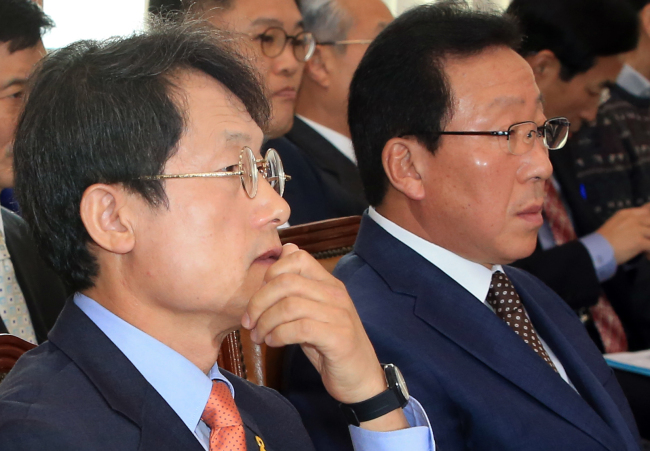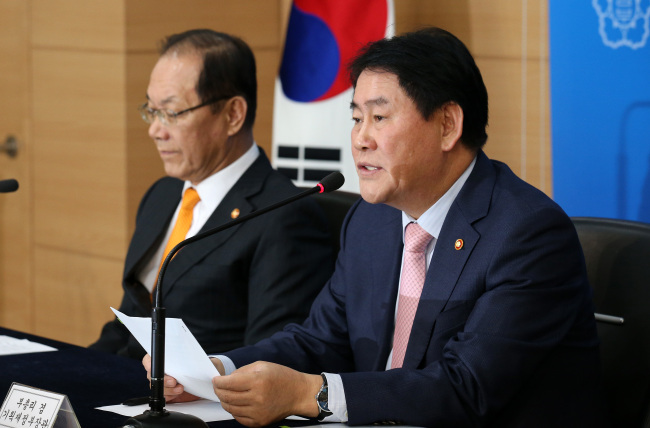No exit in sight for education budget conundrum
Central government, local education offices in standoff over new welfare programs
By Yoon Min-sikPublished : Oct. 16, 2014 - 21:02
The government’s failure to ensure a 2014 budget plan for educational welfare programs is triggering public criticism that President Park Geun-hye is backpedaling on her much-vaunted election pledge to provide free child care.
With the central government and local education offices pressuring each other to fund the state-initiated programs, the sides appear to be heading for yet another standoff.
Last month, the Education Ministry rolled out budget plans for next year that did not earmark any funds for the education welfare programs promised by Park, including the “Nuri” free child care program.
The plans also substantially cut the financial grants for local education from preschool to high school, effectively cutting the overall budget of education offices.
Last Friday, the National Association of Education Superintendents said it would not allocate any of the budget toward free child care after months of heated debate over finances.
“The Nuri program accounts for about 10 percent of our budget, while fixed costs such as labor make up over 70 percent. This means that if the education offices pay for the entire cost of the Nuri program, our actual spending drops by about 30 percent,” Jang Hwi-kook, the education chief for Gwangju and the head of the superintendents’ association, said in a radio interview Thursday.
Seoul Education Chief Cho Hi-yeon recently held a press conference to say that the Seoul Metropolitan Office of Education is facing a deficit of some 360 billion won ($340 million) for this year. The figure is not gigantic compared to its yearly budget of 7.4 trillion won, but things can only get worse next year as the Nuri program’s budget is expected to increase by 110 billion won, he said.
“The Nuri program is a very important policy. But if the local education offices are to pay for it, it will inevitably reduce the budget for other school-related programs,” Cho said in a recent interview with The Korea Herald. “We would have to cut the operating costs of schools, we couldn’t let teachers retire because we can’t afford severance pay, and we would have to take loans to repair old and battered school facilities.”
With the central government and local education offices pressuring each other to fund the state-initiated programs, the sides appear to be heading for yet another standoff.
Last month, the Education Ministry rolled out budget plans for next year that did not earmark any funds for the education welfare programs promised by Park, including the “Nuri” free child care program.
The plans also substantially cut the financial grants for local education from preschool to high school, effectively cutting the overall budget of education offices.
Last Friday, the National Association of Education Superintendents said it would not allocate any of the budget toward free child care after months of heated debate over finances.
“The Nuri program accounts for about 10 percent of our budget, while fixed costs such as labor make up over 70 percent. This means that if the education offices pay for the entire cost of the Nuri program, our actual spending drops by about 30 percent,” Jang Hwi-kook, the education chief for Gwangju and the head of the superintendents’ association, said in a radio interview Thursday.
Seoul Education Chief Cho Hi-yeon recently held a press conference to say that the Seoul Metropolitan Office of Education is facing a deficit of some 360 billion won ($340 million) for this year. The figure is not gigantic compared to its yearly budget of 7.4 trillion won, but things can only get worse next year as the Nuri program’s budget is expected to increase by 110 billion won, he said.
“The Nuri program is a very important policy. But if the local education offices are to pay for it, it will inevitably reduce the budget for other school-related programs,” Cho said in a recent interview with The Korea Herald. “We would have to cut the operating costs of schools, we couldn’t let teachers retire because we can’t afford severance pay, and we would have to take loans to repair old and battered school facilities.”

The ambiguity of the law related to the Nuri program complicates the matter. According to an ordinance on child education that was revised in 2012 by the Lee Myung-bak administration, the Nuri program is to be funded by the regional government bodies.
But Article 1 of the law on regional education budget states that the financial grants for local education should be spent on “education institutes and educational administrative bodies,” referring to schools or education offices. Under the current law, child care centers are classified as nursery institutions, making them subject to supervision under the Ministry of Health and Welfare.
This means that while the ordinance says local education offices are bound to pay for the child care programs, the law does not mandate it.
It also gives local education offices legal grounds to evade financing child care. Although the superintendents said they would support kindergarten students, they said they were not legally bound to provide for children in child care centers.
“Kindergartens are educational institutes, but child care centers are not. The reason we used to provide financial support for children in the centers was because the government used to give us a subsidy for them,” said Jang.
The ministers of education and finance held an impromptu joint press conference on Wednesday to reiterate the government’s determination to push ahead with the child care plan.
“It is the government’s position that the Nuri program for 2015 be conducted without any hiccups,” said Deputy Prime Minister and Finance Minister Choi Kyung-hwan. “(The government) will reflect all expenses for the course in the budget.”

But neither Choi nor Education Minister Hwang Woo-yea clarified the plans to ensure the Nuri program’s financing, as education superintendents across the country have made their stance clear that the government should foot the expense.
“Although the superintendents said they would not spare money for free child care, they are educators and we believe that they will see the importance of the Nuri program and end up shouldering the budget,” the ministry said. It also said that it would not raise the budget for financial grants for local education.
Despite reassuring that the free child care program would be conducted without any problems, the ministry admitted that it had no means to guarantee its continuation if the superintendents refuse to comply.
The association of education chiefs issued a statement later in the day saying their initial position on the budget issue has remain unchanged.
Experts have noted that local education budgets are under severe crisis, but were divided on why.
An Jong-seok, a senior researcher at the state-run Korea Institute of Public Finance, said current welfare policies that focus on providing equal education-related services to all students may deteriorate the quality of core educational services.
Lee Young, an economics professor from Hanyang University, said universal free lunch programs are unfair and an inefficient policy at the root of education offices’ financial difficulties. He said the program’s budget should instead be focused on benefiting underprivileged students.
But Choi Jun-ryeol, a professor of education at Kongju National University, said the Nuri programs should be held responsible for the financial problems as it cost 3.6 trillion won annually, over twice as much as the free lunch program.
Kim Hyeong-guk, head of the local think tank Future and Symmetry Institution and a budget expert, said Korea spends less on education than it should. “The budget for preschool, elementary, middle and high schools is the only major category that saw a decrease in the budget plan,” he said.
Kim, previously a high-ranking official at the Gyeonggi Provincial Office of Education, said Korea should increase its public education spending by about 10 percent considering the sizes of its population and economy.
Among member countries of the Organization for Economic Cooperation and Development, an average of 92 percent of the funds for primary, secondary, and postsecondary nontertiary educational institutions came from public sources, according to OECD Education at Glance 2014. But this share was a little more than 80 percent in Korea; only Chile and Colombia had lower figures.
This shows that the Korean government spends less on public education than other wealthy countries around the world.
“Everything in Korea is changing to meet the standards of an advanced nation. It’s about time the same thing happened in education,” Kim said.
By Yoon Min-sik (minsikyoon@heraldcorp.com)


![[Exclusive] Korean military set to ban iPhones over 'security' concerns](http://res.heraldm.com/phpwas/restmb_idxmake.php?idx=644&simg=/content/image/2024/04/23/20240423050599_0.jpg&u=20240423183955)

![[Graphic News] 77% of young Koreans still financially dependent](http://res.heraldm.com/phpwas/restmb_idxmake.php?idx=644&simg=/content/image/2024/04/22/20240422050762_0.gif&u=)



![[Pressure points] Leggings in public: Fashion statement or social faux pas?](http://res.heraldm.com/phpwas/restmb_idxmake.php?idx=644&simg=/content/image/2024/04/23/20240423050669_0.jpg&u=)










